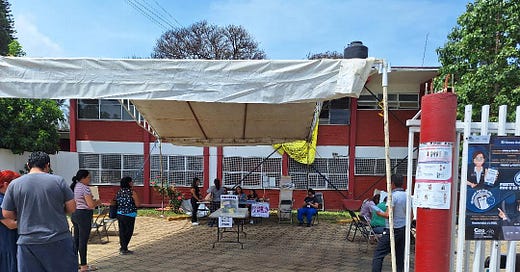Who Judges the Judges?
Shalzed has questions following Mexico's elections to choose 2700 judges
Introducing the New Shalzed
Those who have been following Shalzed will notice a recent change. He no longer wears a cape and no longer was once a superhero. Instead, he is now a scientist from a faraway, peaceful planet transported to Earth in a wormhole experiment gone awry. You can read his new bio here.
Today a Question
Some Fridays Shalzed sends an episode in which he catches up with a political figure or activist with views on human rights that would never be tolerated on his home world. Other weeks he sends a question about a human rights issue in the news, to explain the problem and hear new ideas. That’s what appears below- a question about what lessons we can learn about judicial appointments and even democracy itself from elections in Mexico last Sunday.
Who Judges the Judges?
Last Sunday Mexico conducted its first nationwide judicial election, completing a sweeping overhaul of its judiciary. This is the culmination of a reform that has been dubbed ‘a date with democracy’. It is an effort to fight corruption, the government surrendered its authority to appoint judges and returned that power directly to the people.
To make sure that newly elected judges would not be beholden to special interests, campaign donations and fundraising were illegal. Everything had to be self-financed. Of course, this would enormously favor the wealthy, so there were also strict limits on spending. To further level the playing field, paid advertising was also prohibited- no TV, no billboards, no sponsored posts online.
The only campaigning candidates were allowed to do was to distribute printed literature, speak in public, and hope their social media posts would somehow go viral. One candidate went on Tinder, set his preferences for men and women of all ages, and told anyone he matched with about his campaign (this only lasted one day before being shut down for going against Tinder’s terms of service, but due to media coverage it did succeed at getting that candidate attention.)
While these sorts of ultra-low budget campaigns might seem idyllic to anyone sick and tired of endless 30 second attack ads paid for by groups trying to curry favor by donating campaign cash, this system also has serious problems. Most significantly, the strict limits on campaigning made it very difficult for the public to find out about the candidates. This was compounded by the enormous number of judgeships up for election and the large number of candidates for many of the positions.
For example, all Mexican voters had to select from 64 candidates vying for 9 seats on the Supreme Court. But that was just the beginning. In the state of Chihuahua voters also selected 305 local judges from approximately 900 candidates, going through six federal and seven local ballots in the process.
Only around 13 percent of eligible Mexicans cast a ballot. This is much lower than what’s typical for a presidential race.
Mexican President Claudia Sheinbaum declared this election a success, saying that Mexico has now become one of the world’s most democratic countries. Opposition leaders criticized the vote, noting that 87% of Mexicans decided not to show up and the ones that did likely knew little to nothing about who they were choosing.
The right to vote is a bedrock of human rights. But does this recent election in Mexico show that there can be too much democracy? Allowing anyone to run seems democratic, but it means voters may need to choose from an enormous list of candidates and be unable to become knowledgeable about all their choices. Forbidding fundraising limits the influence of special interests, and greatly increases the opportunity for newer, less established candidates to compete. But it also means the public has to work to seek out information, as election-related advertising isn’t served up during television broadcasts and while browsing online. Is asking citizens to do their own leg work to become informed about hundreds of candidates and then make thoughtful decisions across numerous ballots on election day too great a demand?
And if so, what’s a better way to select judges? If the number of candidates is limited, on what basis will that be done and how can we be sure that limitations of ballot access won’t become a tool of control or discrimination? If judges are just appointed by the government we would once again be faced with all the problems Mexico’s judicial reform set out to solve. For judges to be selected by legal experts begs the question of how those legal experts will themselves be chosen.
What are your thoughts on the limits of democracy and the best way to choose judges? I look forward to hearing your comments.






Shlomo—yes, it did feel overwhelming and obviously there’s a lot to work through. But, as I note in my post on the subject, the majority of people here support the election of judges, 66%-29%. That there was a low turnout seems to have had a lot more to do with the lack of familiarity with the process and not a lack of support from we voters. https://open.substack.com/pub/markstatman/p/an-undemocratic-vote-says-who?r=46wah&utm_campaign=post&utm_medium=web&showWelcomeOnShare=false